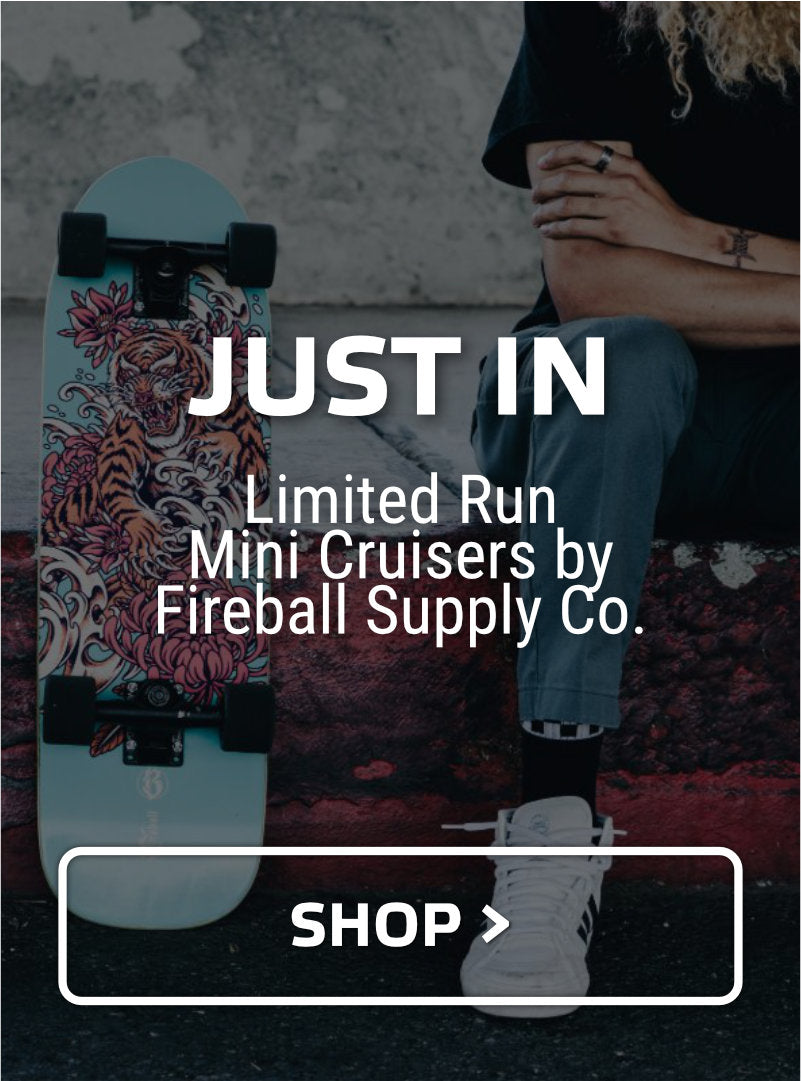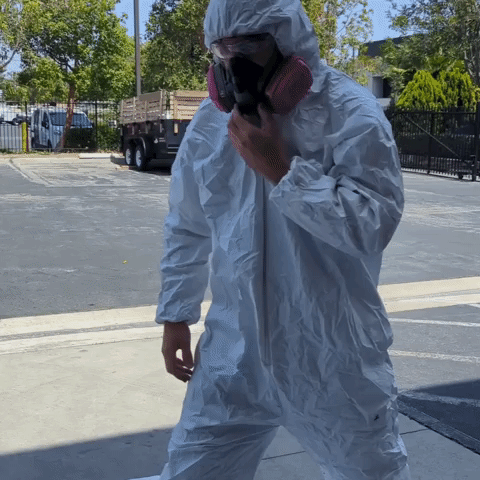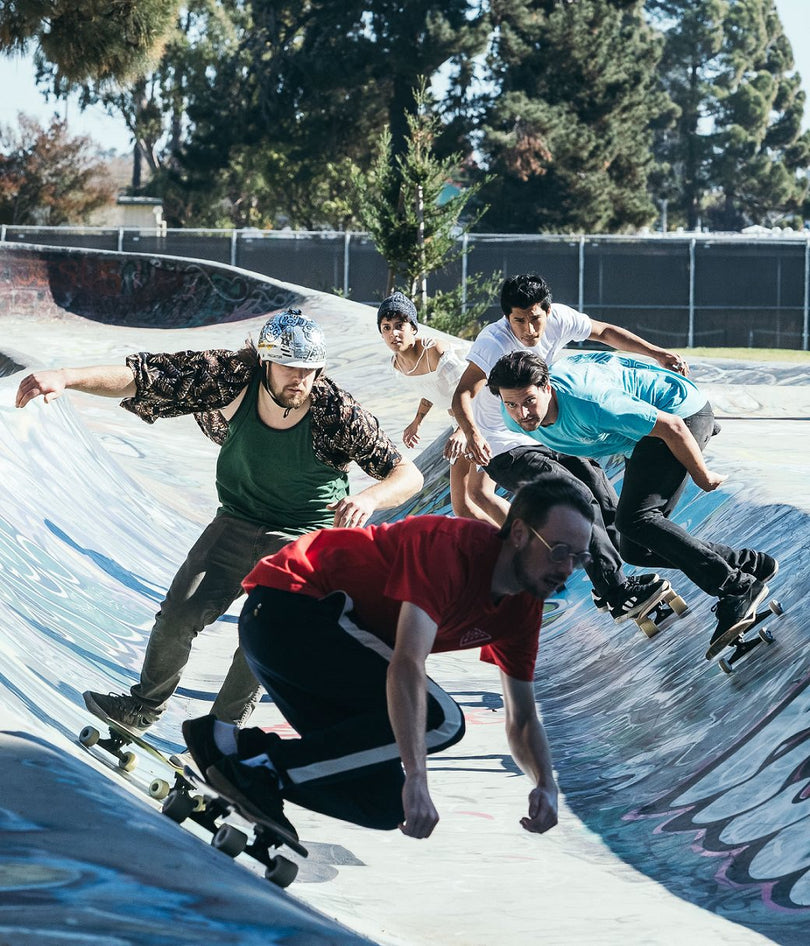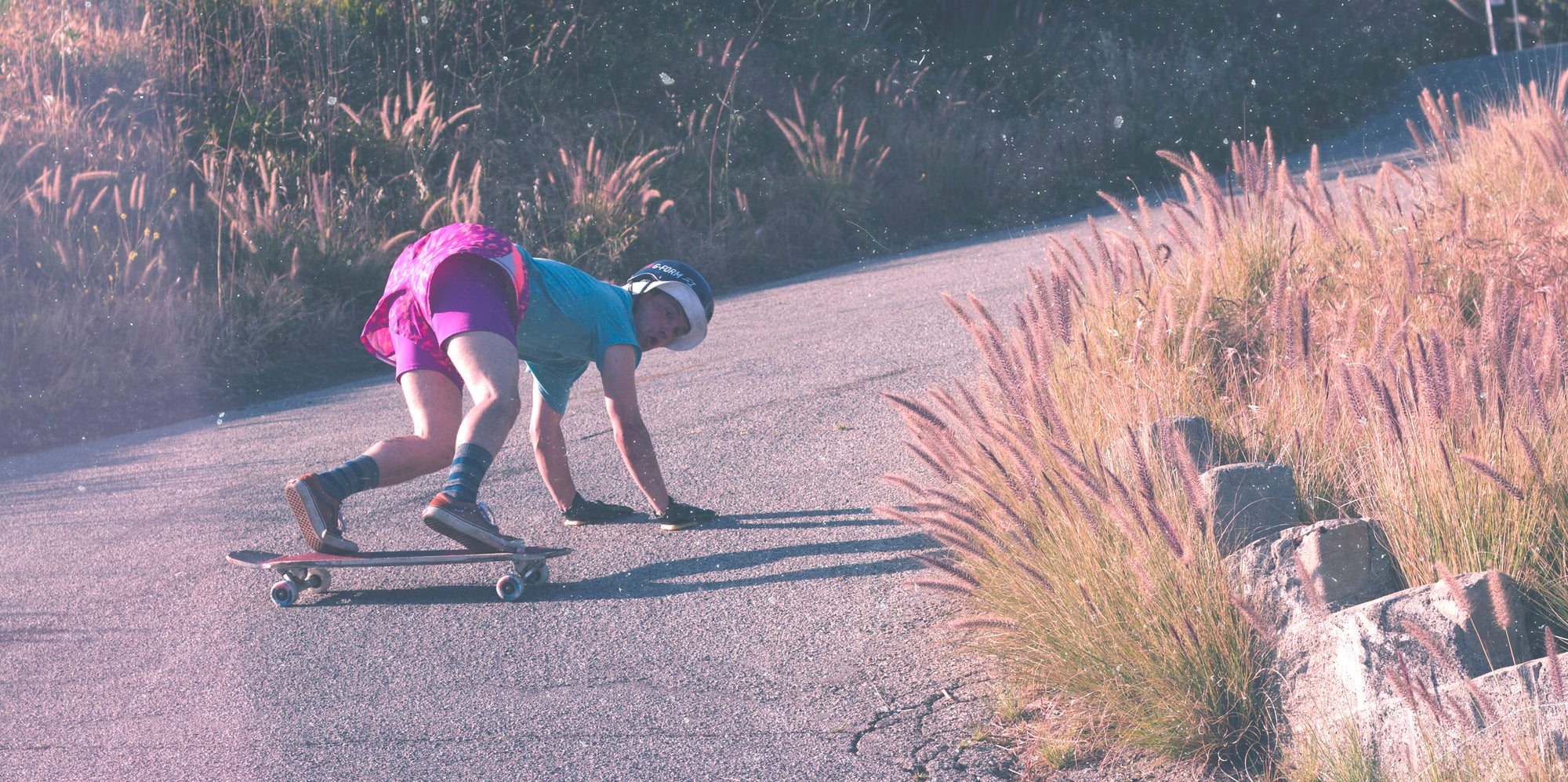Coffee or tea? Coke or Pepsi? Roll under or roll over? Caliber or Paris?

It's a question added to the long list of divisive and controversial questions, of which almost everyone has an opinion. This article will explain the key differences so you can make the decision for yourself.
Truck History
When I first started skating you pretty much had two choices in terms of cast trucks: Paris or Randal.
The choice was pretty simple. Paris had the nice fit and finish and Randal was the inexpensive classic. The same heated arguments about trucks still occurred, just with different brands and for different reasons.
At the end of 2010, Caliber Trucks launched. Caliber branded themselves as a truck designed for the growing freeride scene. We now think of freeriding as the most popular form of the sport. This made Paris, who had built up a reputation as good carving trucks, look a bit out of touch with the trends.

Caliber took the truck market by storm through their provocative ads and amazing team riders.
The community ate up Caliber. They were sexy, had good team riders, and most importantly, they were stable. Caliber brought to the table beefy hangers, lower degrees, and restrictive bushing seats to affordable cast trucks.
Now fast forward to late 2012: The Paris V2 comes out. Suddenly, trusty Paris is offering a truck that can do everything and it quickly becomes the new most-sought-after truck. Why?
We’ll get into the specs in a minute, but first it must be mentioned that in the summer of 2014 Caliber also released their “Caliber II” truck to get us to where we are today.

Paris seriously upped their game with the V2s, solving any complaints riders had with V1s.
Let's go over the descriptions from both Paris and Caliber on their newest Version II trucks.
Caliber II Overview
Caliber stepped up the game by improving the truck strength, bushing seat, pivots, kingpin, and paint colors. The Caliber II introduced the "Satin" colorway, which has a very classy anodized look.

Caliber made several notable changes, but did not officially discontinue their OGs (version 1s) at the time of version II release.
Paris V2 Overview
Paris has upgraded their truck by adding better washer and kingpin clearance, longer lasting powder coat, and stronger hangers. Colors improved and stand a step above almost every other truck company.
Paris slashed all V1s at the V2 release, which set the new standard for the brand.
You can look into each company’s descriptions of their own trucks, but you have to take everything they say with a grain of salt because, obviously, they're trying to sell their products. This makes them incredibly biased. Here’s a table I created that attempts to get rid of the frills and set up the differences between the two:
| Specification | Paris Trucks | Caliber Trucks |
|---|---|---|
| Hanger Length | 150mm (8.5" equivalent) 180mm (10" equivalent) 195mm (10.5" equivalent) |
9.0" (160mm equivalent) 10.0" (180mm equivalent) |
| Axle Width | 8mm | 8mm |
| Truck Style | Reverse Kingpin (RKP) | Reverse Kingpin (RKP) |
| Building Material | 356.2 Virgin Aluminum gravity molded baseplate and hanger, 2 heat treatment processes | A356 Virgin Aluminum heat treated to T6 specifications with 4140 Chromoly axles. In house treatment for “up to 40% strength gains”. |
| Faced Hangers | Yes | Yes |
| Kingpin Grade | Grade 8 | Grade 8 |
| Pressed in Kingpin | Yes, a flat head bolt is knurled for precision fitment. | Yes, a hexagonal bolt is pressed in for precision fitment. |
| Baseplate Angles | 43 degree 50 degree |
44 degree 50 degree |
| Price (2 trucks) | $49.92 | $50.88 |
| Lifetime Guarantee | Yes. | Yes, but not advertised. |
| Stock Bushings | 90a Divine Bushings | 89a Blood Orange Bushings |
| Truck Mounting Pattern | New and Old School | New and Old School |
| Weight (2 trucks) | 920 grams | 970 grams |
| Rake | Yes, for a diving turn. | No, for a predictable turn. |
| Color Options (Hanger/Baseplate) | Black/Black Black/Raw Silver/Purple Gold/Gold White/White Raw/Raw Blue/Blue Red/Red Orange/Orange Pink/Pink Special Pro Models Kittens |
Black Out |
You should notice a ton of similarities. In fact, these two trucks are almost identical on paper. So what causes all the debate? Truck feel.
The Importance of Truck Feel
A lot of the “feel” in trucks are represented by things that are very hard to measure, such as the shape of the bushing seat. So here is my own comparison of the trucks from personal experience.

Paris (left) has more of a bowl bushing seat that allows for a more fluid carve. Caliber (right) has steps that lock in bushings and provide more stability.
Paris Truck Feel: The All Around
Paris trucks have a more open bushing seat provides more turn, responsiveness, and return to center. This also turn brings some twitchiness. I do not, however, want to promote the idea that Paris are bad at speeds. With the right bushing setup, Paris are sick DH trucks with good lean. They have beefiER hangers than the V1s which bent all the time that are strong enough to withstand most riding for a good amount of time, but are still quite light, and will be replaced by Paris for free if you do manage to bend them.

Hutton Richardson shreds freestyle. Paris are versatile unlike anything else out there. Photo by Arian Chamasmany
Overall, I would recommend Paris for general freeriding and freestyle due to their flowy feeling that is still relatively stable, especially in the 43 degree version (which I’m currently using). These trucks can take on anything and are still great for DH, and if you need any proof just ask Matt K, he takes them up to 70mph.
For those just getting started, Stoked always recommends 50 degree Paris for carving set ups (think Loaded Boards, etc). This is because of their exceptional flow and turn. For those more into downhill that want Paris, take a look at the 43 degree. But remember gang, these are just suggestions to get you started. Everyone is going to have their own personal taste.
I'm a perfect example: I actually like Paris for downhill and freeride OVER Caliber just because I like the flow that they have that goes hand in hand with carving. To each their own!
Caliber Truck Feel: Downhill/Freeride Machine
Calibers have a tighter bushing seat that adds stability, gang$ter lean, and a better center point at the expense of a more flowy feeling. Some people might criticize them as feeling flat, but really they should be saying stable.

Liam Morgan rails a corner on Caliber trucks. The stability of Caliber is unmatched among cast trucks.
Calibers inspire serious confidence at speed and you will find yourself appreciating that “flatness” as you bomb hills without the slightest twitch. They are noticeably heavier, but have super thick hangers that are much more difficult to bend. No warranty though.
In general, Calibers are a more downhill-oriented truck, but can also be used for freeride with unparalleled stability in a cast truck.
For those just getting started, Stoked always recommends Caliber 44 (lean) or Caliber 50 (turn) for downhill/freeride set ups (think Rayne, Pantheon, Omen, etc). This is because they tend to be more stable with speed. Also, the extra beef weight doesn't lend well to a board you're going to be carrying around all the time.
Other Truck Variations
It is worth noting that both companies do not just make quality cast trucks. Caliber makes a high end precision truck and Paris makes a high end forged truck. Each are largely based off their cast cousins and we stand by our same recommendations.
Both companies also make very high quality traditional kingpin trucks (TKP). Paris TKPs feel very flowy and similar to their RKP brother. Caliber TKPs are more like Independent Trucks and very linear.
Wrap Up
We recommend Paris for boards designed for freeride and carving and Caliber for boards more oriented for downhill/freeride. That being said, these are just general guidelines with tons of exceptions. Both are amazing trucks.
If you have more than 3 boards in your quiver, chances are you have both Paris and Caliber. I know I do.
Try out both and let us know your thoughts. We’d love to hear from you. See our contact page.
So what will it be: Caliber or Paris?
...Or both?








